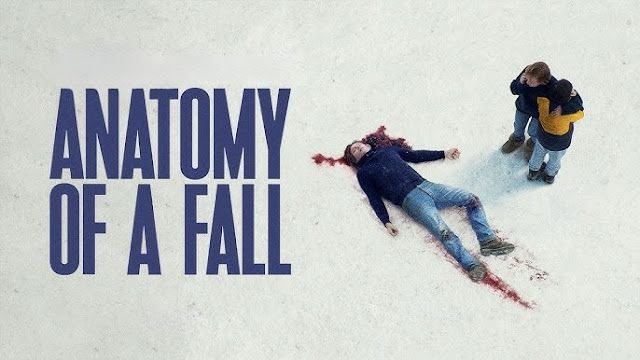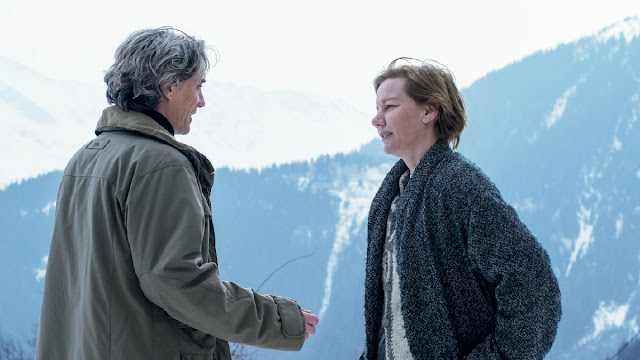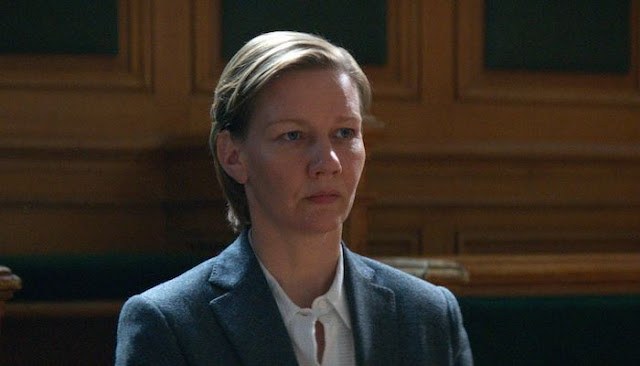“When we’ve looked everywhere and still don’t understand how the thing happened, I think we have to ask why it happened.”
When tragedy strikes, it is not always apparent why it did. There may be signs that it is coming, and there may not be. Sometimes the signs are there, but we fail to notice them in the chaos of everyday life, or sometimes they are just too subtle for us to pick up on until after the fact when the results are before us, and all we can do is look back at the events leading up to it and examine what we may have failed to notice before. Anatomy of a Fall is just one such example of an extreme situation where the warning signs were there but went unnoticed until things were too late. But it is not just an examination of the signs but also an examination of a marriage where neither side is innocent, and the resolution is anything but conclusive.
The setting is an isolated chalet near Grenoble, France. Novelist Sandra Voyter (Sandra Hüller) is forced to reschedule an interview with a female student because, during the interview, her husband, who is working in the attic, intentionally cranks up his music to disrupt them. After the student leaves, Sandra retires to her room for a nap and is awakened by her son’s screams, having found his father lying dead in the snow from a fall out the attic window.
The police and paramedics arrive, and an investigation is launched with Sandra obviously being the only suspect. Evidence is inconclusive, with there being signs that point at both the possibility of an assault as well as suicide. Sandra’s son, Daniel (Milo Machado-Graner), is called to testify about what he overheard between his parents prior to the death. To ensure no pressure is being put on him by Sandra prior to the testimony, a court-appointed person is placed in the house to monitor all interaction between them. Daniel is legally blind, a condition that came about from an accident while being supervised by his father, Samuel (Samuel Theis), a fact the prosecution brings up as a possible sore point in their marriage. Daniel’s testimony becomes a sticking point, though, as he changes his story once it becomes obvious he couldn’t have overheard their conversation right before the death. Other revelations that come up during the trial will challenge his understanding of his parents relationship as well as stir up other memories that may or may not cast a new light on the case.
Relationships are like onions. They have many layers, and those layers have to be peeled away to get to the core. No matter how basic a marriage may seem on the outside, there are always things underneath that only the couple sees. Sometimes there are even layers beyond that. As we get further and further into the narrative of Anatomy of a Fall, those layers get stripped away little by little, and what we think we know about that marriage turns out to be completely wrong. Early on, Sandra calls up her attorney and friend, Vincent (Swann Arlaud), and reveals that her husband had attempted suicide some months back, something she hadn’t mentioned during their earlier meeting. This seems like a confession of convenience, something perhaps made-up in a desperate attempt to explain away his death. It rings false when she says it and serves to muddy up the waters of the investigation. Yet this revelation will come back later in a most unexpected way in the climax, revealing itself to be much more than what it initially appeared to be.
The great mystery of the story is whether Samuel jumped from the attic or was pushed to his death. Even though Sandra is eventually acquitted for the crime, the film doesn’t tell us 100% that he did kill himself. The jury makes their decision based on last-minute testimony from Daniel, but that testimony is still subjective, up for interpretation. There is a difference between Not Guilty and Innocent. The weekend before Daniel is slated to offer his final testimony, he requests to have no contact whatsoever with his mother, and she has to leave the house and stay in a hotel. After the final verdict comes down, though, she goes out with Vincent for celebratory drinks and dinner before finally coming home to her son. This seems an odd decision for her to make, delaying the reunion with her son and tells us a little something about her character and her relationship with her family.
It’s also revealing about her when it comes out in the trial that she had had numerous affairs during the course of her marriage to Samuel. The prosecution calls her out for this, and she deflects it by stating that Samuel was aware and didn’t care about most of them, excluding her most recent affair with a woman, which she hid from him until he discovered it on his own. This seems to conflict with words the two had during an argument that Samuel recorded without her knowledge. Likewise, he accused her of stealing his best literary idea for a book she published. She claimed that he had abandoned the project and gave her his blessing to use the idea. In both cases, we have just her word on it. So much of the picture built before the jury is funneled through her own testimony of events, a testimony which paints her in the best possible light considering the known facts.
Anatomy of a Fall received the Palme d’Or at the 76th Cannes Film Festival, becoming one of only three films directed by a woman to receive this honor. Soon afterwards, controversy struck when director Justine Triet criticized French President Emmanuel Macron’s repression of the pension reform protest movement during her acceptance speech at Cannes. It has been speculated that this criticism is the reason Anatomy of a Fall was not France’s official submission for the International Feature Film Oscar, an award it could have easily won. Instead, France chose to nominate The Taste of Things, a historical romantic drama starring Juliette Binoche and Benoît Magimel. Anatomy of a Fall would get Oscar recognition, anyway, by receiving a nomination for Best Picture as well as four others, winning solely for the screenplay.
The film is complex, defying anything as simple as a plot summary thanks to the many nuances of the screenplay and the absolutely riveting performance by Sandra Hüller. Every single time she is on the stand giving testimony, you want to believe her and feel bad for her, but at the same time, there is still lingering doubt that never goes away. Sandra is mesmerizing as she lays bare an intimate look at a marriage that has been rotting on the vine long before her husband died. When the dust has settled and the verdict is read, it is still uncertain whether the jury got it right, and we go into the end credits feeling just a little unsettled over the whole affair. This is simply brilliant filmmaking, and Anatomy of a Fall will, quite frankly, stick with you long after those credits start to roll.
Academy Award Nominations:
Best Picture: Marie-Ange Luciani and David Thion
Best Director: Justine Triet
Best Actress: Sandra Hüller
Best Original Screenplay: Justine Triet and Arthur Harari (won)
Best Film Editing: Laurent Sénéchal
____________________________________________________
Release Date: August 23, 2023
Running Time: 152 Minutes
Rated R
Starring: Sandra Hüller, Swann Arlaud, Milo Machado-Graner, Antoine Reinartz, Samuel Theis, Jehnny Beth, Saadia Bentaïeb, Camille Rutherford, Anne Rotger, and Sophie Fillières
Directed By: Justine Triet









Comments
Post a Comment